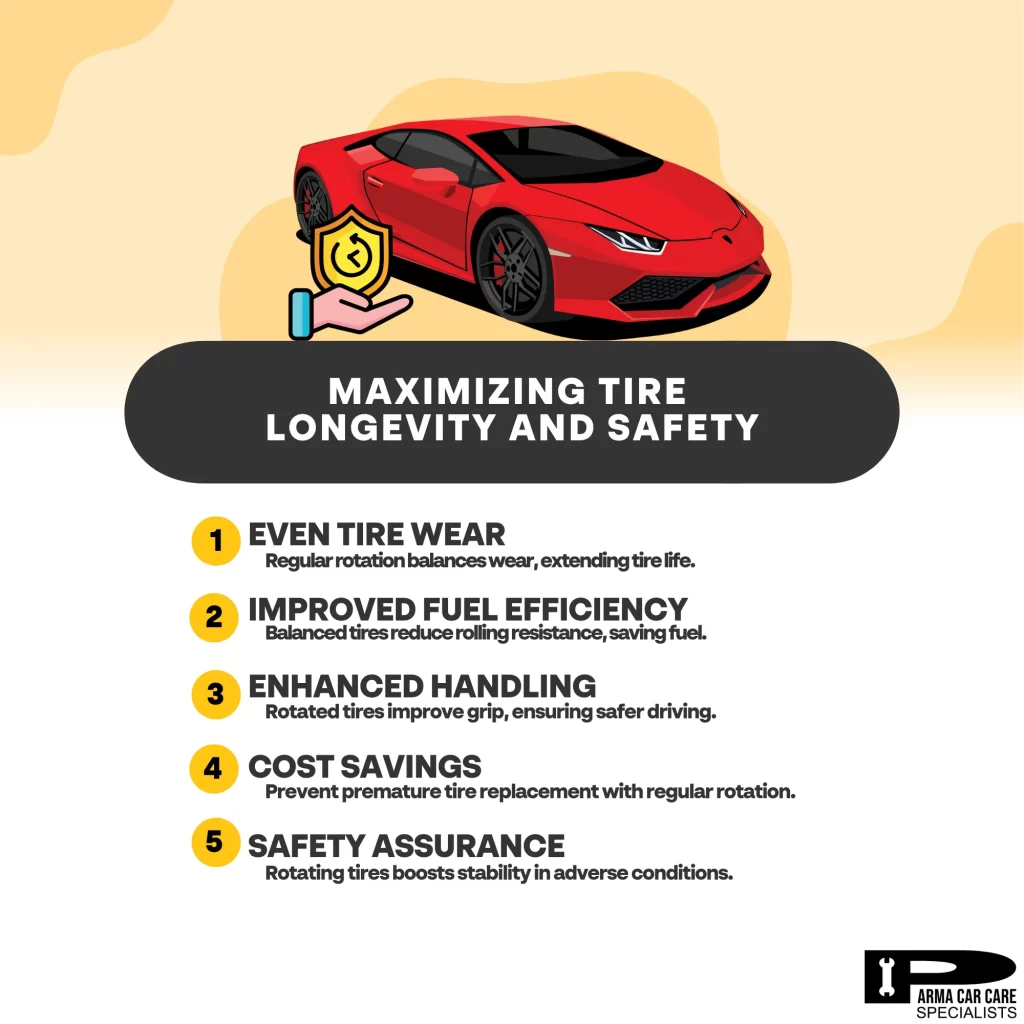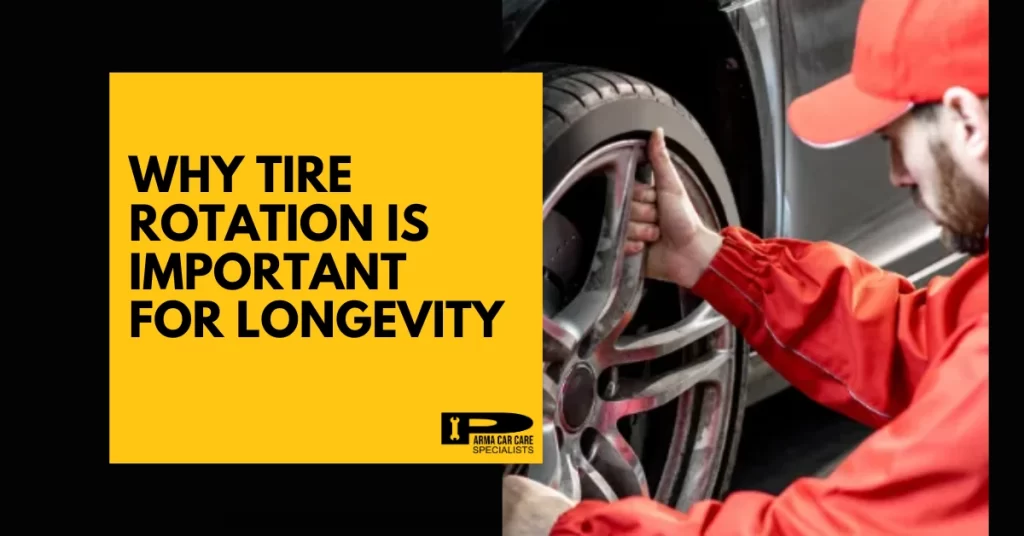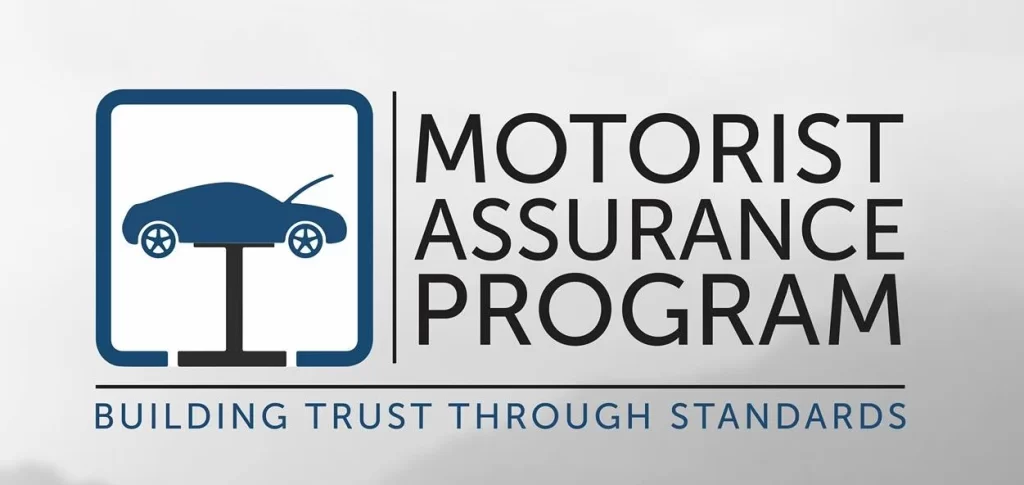Tire rotation is a key requirement for the longevity of your vehicle, as it promotes even tire wear across all four tires. When you rotate your tires every 5,000 to 7,500 miles, you increase handling and traction, which leads to safer driving, especially in adverse conditions. This practice also improves fuel efficiency by reducing rolling resistance and maintaining ideal tire pressure. Proper rotation also minimizes the risk of costly replacements by preventing uneven wear that can compromise your vehicle’s handling. Understanding the signs that indicate when to rotate will further extend your tires’ lifespan and improve overall performance—there’s more to explore on this topic.

Key Takeaways
- Tire rotation promotes even wear, extending the lifespan of all tires by preventing premature degradation of any single tire.
- Regular rotation reduces the risk of costly tire replacements by maintaining balanced tread wear across all four tires.
- Increased traction from evenly worn tires contributes to better handling, improving overall vehicle performance and safety.
- Maintaining optimal tire pressure through rotation leads to improved fuel efficiency, further prolonging tire life and reducing overall driving costs.
- Visual inspections and seasonal changes serve as indicators for rotation, helping to identify wear issues before they cause significant damage.
Even Tire Wear
To guarantee even tire wear, it is crucial to rotate your tires regularly. Uneven wear often occurs due to the weight distribution of your vehicle and driving habits. For instance, the front tires typically wear more quickly than the rear tires because they handle steering and braking forces. By adhering to the recommended tire rotation schedule—usually every 5,000 to 7,500 miles—you can mitigate this issue.
The importance of tire rotation lies in its ability to promote even tire wear across all four tires, extending their lifespan and maintaining peak performance. When you rotate your tires, you’re redistributing the wear patterns, which helps each tire to perform effectively. This not only heightenssafety by improving traction but also contributes to better fuel efficiency.
Maintaining even tire wear can also reduce the likelihood of costly replacements or repairs down the line. Regular rotation keeps your tires balanced and aligned, preventing premature aging and ensuring a smoother ride. In short, prioritizing tire rotation is a proactive step that pays off in the long run, keeping your vehicle running smoothly and efficiently.
Improved Handling and Performance
Regular tire rotation not only promotes even tire wear but also considerably improves your vehicle’s handling and performance. When you rotate your tires, you guarantee that each tire experiences a similar level of wear, which is essential for maintaining peak traction. Uneven tire wear can lead to compromised grip, particularly during cornering or sudden maneuvers, increasing the risk of losing control.
The importance of tire rotation extends to the stability and responsiveness of your vehicle. Tires with consistent wear patterns maintain better contact with the road, resulting in improved steering response and overall handling dynamics. This is especially important in high-speed driving or adverse weather conditions, where performance can make a significant difference in safety.
Balanced tire wear also contributes to a more predictable driving experience, allowing you to navigate turns and emergency stops with greater confidence. By adhering to a regular tire rotation schedule, you not only boost handling and performance but also prolong the lifespan of your tires, guaranteeing that your vehicle remains reliable and safe on the road.
Improved Fuel Efficiency
Consistent tire rotation can remarkably increase your vehicle’s fuel efficiency. When you rotate your tires regularly, you help guarantee even wear across all four tires. This uniformity contributes to less rolling resistance, which means your engine doesn’t have to work as hard to propel the vehicle. As a result, you’ll enjoy improved fuel efficiency, ultimately saving you money at the pump.
Here are some key points about the importance of tire rotation and its impact on fuel efficiency:
- Reduced Rolling Resistance: Evenly worn tires create less friction, allowing for smoother movement.
- Optimal Tire Pressure: Regular rotation helps maintain proper tire pressure, which is vital for fuel economy.
- Enhanced Traction: Properly rotated tires provide better grip, leading to more efficient driving.
- Longer Tire Life: Extending tire lifespan means fewer replacements, translating to cost savings.
- Consistent Performance: Balanced tire wear ensures predictable handling, aiding in fuel efficiency during acceleration and braking.
Safety First
Ensuring your vehicle’s safety should be a top priority for every driver. One vital aspect of maintaining that safety is understanding the importance of tire rotation. Regular tire rotation helps distribute wear evenly across all four tires, which strengthens grip and stability. This balanced wear is imperative for safe handling, especially during sudden maneuvers or adverse weather conditions.
Equally important is tire alignment. If your tires aren’t aligned properly, you’ll experience uneven wear, which can compromise your vehicle’s handling and braking efficiency. Misalignment can lead to your vehicle pulling to one side, increasing the risk of losing control. By rotating your tires regularly and ensuring proper alignment, you not only extend the life of your tires but also improve your overall driving safety.
When to Rotate Your Tires
To maintain ideal tire performance and longevity, it’s important to know when to rotate your tires. Regular tire rotation is vital because it evenly distributes wear across all tires, increasing their lifespan and improving vehicle handling. Generally, you should rotate your tires every 5,000 to 7,500 miles, but it’s best to consult your vehicle’s owner manual for specific recommendations.
Here are some key indicators that signal when tire rotation is needed:
- Uneven tread wear: Check for significant differences in tread depth between tires.
- Vibration or noise: Unusual sounds or vibrations during driving can indicate wear issues.
- Seasonal changes: If you switch from winter to summer tires, it’s a good time for rotation.
- After long trips**: Consider a rotation after extended driving to guarantee even tire wear.
- Visual inspections: Regularly examine your tires for signs of wear or damage.
Recognizing the importance of rotating tires not only prolongs their life but also contributes to safer driving. By being proactive about when tire rotation is needed, you can promote peak performance and upgrade your vehicle’s reliability.
Frequently Asked Questions
How Often Should I Check My Tire Pressure?
You should check your tire pressure at least once a month and before long trips. Maintaining proper pressure guarantees peak performance, enhances fuel efficiency, and prolongs tire life, keeping your vehicle safe and reliable.
Can I Rotate My Tires Myself?
Yes, you can rotate your tires yourself. Make certain you have a proper jack, jack stands, and a lug wrench. Follow your vehicle’s manual for the specific rotation pattern, guaranteeing even tire wear and peak performance.
What Tools Do I Need for Tire Rotation?
You’ll need a jack, jack stands, a lug wrench, and a torque wrench for tire rotation. These tools guarantee safety and precision, allowing you to properly lift your vehicle and secure the tires efficiently.
Does Tire Rotation Affect My Vehicle Warranty?
Tire rotation typically doesn’t hinder your warranty; however, you should check your specific warranty guidelines. Proper maintenance practices, like regular rotations, often guarantee peak performance and might help uphold your vehicle’s warranty requirements.
What Happens if I Don’t Rotate My Tires?
If you don’t rotate your tires, uneven wear occurs, leading to reduced traction and handling. This can compromise safety, increase stopping distances, and ultimately require premature tire replacement, costing you more in the long run.
Conclusion
To conclude, regular tire rotation is vitally important for maximizing your tires’ lifespan and ensuring your vehicle operates safely and efficiently. If you neglect this simple maintenance task; your front tires could wear down considerably faster, leading to poor handling and a blowout on a rainy day. By adhering to a rotation schedule, you can avoid these risks, boost performance, and save money on premature tire replacements. Prioritize tire rotation, and keep your vehicle in premium condition.
















